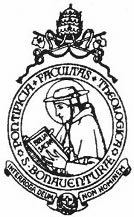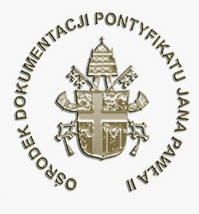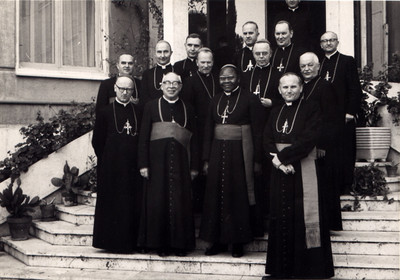 On October 28th, Pope Benedict wrote to Most Reverend Father Marco Tasca Minister General of the Friars Minor Conventual and Grand Chancellor of The Pontifical Theological Faculty of St Bonaventure Seraphicum on the occasion of an institute dealing with the theme of "The Second Vatican Council in the Pontificate of John Paul II." Here are a few relevant paragraphs from His Holiness:
On October 28th, Pope Benedict wrote to Most Reverend Father Marco Tasca Minister General of the Friars Minor Conventual and Grand Chancellor of The Pontifical Theological Faculty of St Bonaventure Seraphicum on the occasion of an institute dealing with the theme of "The Second Vatican Council in the Pontificate of John Paul II." Here are a few relevant paragraphs from His Holiness:
 In practically all his documents, and especially in his decisions and his behaviour as Pontiff, John Paul II accepted the fundamental petitions of the Second Vatican Council, thus becoming a qualified interpreter and coherent witness of it. His constant concern was to make known to all the advantages that could stem from acceptance of the Conciliar vision, not only for the good of the Church but also for that of civil society itself and of the people working in it. "We have contracted a debt to the Holy Spirit", he said in his Reflection prior to the Angelus on 6 October 1985, referring to the extraordinary session of the Synod of Bishops which was about to be celebrated precisely in order to reflect on the Church's response during the 20 years that had passed since the conclusion of the Second Vatican Council. "We have contracted a debt to the Spirit of Christ.... This, in fact, is the Spirit who speaks to the Churches (cf. Rv 2: 7); during the Council and by means of it, his word has become particularly expressive and decisive for the Church" (ore, 14 October 1985, p. 12).
In practically all his documents, and especially in his decisions and his behaviour as Pontiff, John Paul II accepted the fundamental petitions of the Second Vatican Council, thus becoming a qualified interpreter and coherent witness of it. His constant concern was to make known to all the advantages that could stem from acceptance of the Conciliar vision, not only for the good of the Church but also for that of civil society itself and of the people working in it. "We have contracted a debt to the Holy Spirit", he said in his Reflection prior to the Angelus on 6 October 1985, referring to the extraordinary session of the Synod of Bishops which was about to be celebrated precisely in order to reflect on the Church's response during the 20 years that had passed since the conclusion of the Second Vatican Council. "We have contracted a debt to the Spirit of Christ.... This, in fact, is the Spirit who speaks to the Churches (cf. Rv 2: 7); during the Council and by means of it, his word has become particularly expressive and decisive for the Church" (ore, 14 October 1985, p. 12). We are all truly indebted to him for this extraordinary ecclesial event. The multiple doctrinal legacy that we find in its Dogmatic Constitutions, Declarations and Decrees still stimulates us to deepen our knowledge of the Word of God in order to apply it to the Church in the present day, keeping clearly in mind the many needs of the men and women of the contemporary world who are extremely in need of knowing and experiencing the light of Christian hope. The Synod of Bishops that has just ended placed these needs at the centre of its own rich and fruitful reflections, reaffirming the hope expressed in the past by the Constitution Dei Verbum: "So may it come that, by the reading and study of the sacred books, "the Word of God may speed on and triumph' (2 Thes 3: 1), and the treasure of the Revelation entrusted to the Church may more and more fill the hearts of men" (n. 26), bringing them the salvation of God and with it authentic happiness.
We are all truly indebted to him for this extraordinary ecclesial event. The multiple doctrinal legacy that we find in its Dogmatic Constitutions, Declarations and Decrees still stimulates us to deepen our knowledge of the Word of God in order to apply it to the Church in the present day, keeping clearly in mind the many needs of the men and women of the contemporary world who are extremely in need of knowing and experiencing the light of Christian hope. The Synod of Bishops that has just ended placed these needs at the centre of its own rich and fruitful reflections, reaffirming the hope expressed in the past by the Constitution Dei Verbum: "So may it come that, by the reading and study of the sacred books, "the Word of God may speed on and triumph' (2 Thes 3: 1), and the treasure of the Revelation entrusted to the Church may more and more fill the hearts of men" (n. 26), bringing them the salvation of God and with it authentic happiness.This is a commitment that I am pleased to entrust in particular to you, dear Professors of the Pontifical Theological Faculty, who venerate the Seraphic Doctor St Bonaventure as its heavenly Patron. In the wealth of his thought, St Bonaventure can offer interpretative keys which are still up-to-date and with which you may approach the Conciliar Documents to seek in them satisfactory answers to the many questions of our time. The anxiety for humanity's salvation which motivated the Council Fathers, guiding their commitment in the search for solutions to the numerous problems of the day was equally alive in St Bonaventure's heart as he faced the hopes and anguish of the people of his own time. On the other hand, since the basic questions that man carries in his heart do not change with the changing of times, the answers the Seraphic Doctor attained have remained substantially applicable also in our day. In particular, the Itinerarium mentis in Deum that St Bonaventure composed in 1259 has remained valid. Although it is a guide to the heights of mystical theology, this precious little book also speaks to all Christians of what is essential in their lives. The ultimate goal of all our activities must be communion with the living God. Thus, for the Fathers of the Second Vatican Council too, the ultimate aim of all the individual aspects of the Church's renewal was to lead the faithful to the living God revealed in Jesus Christ.


Leave a comment